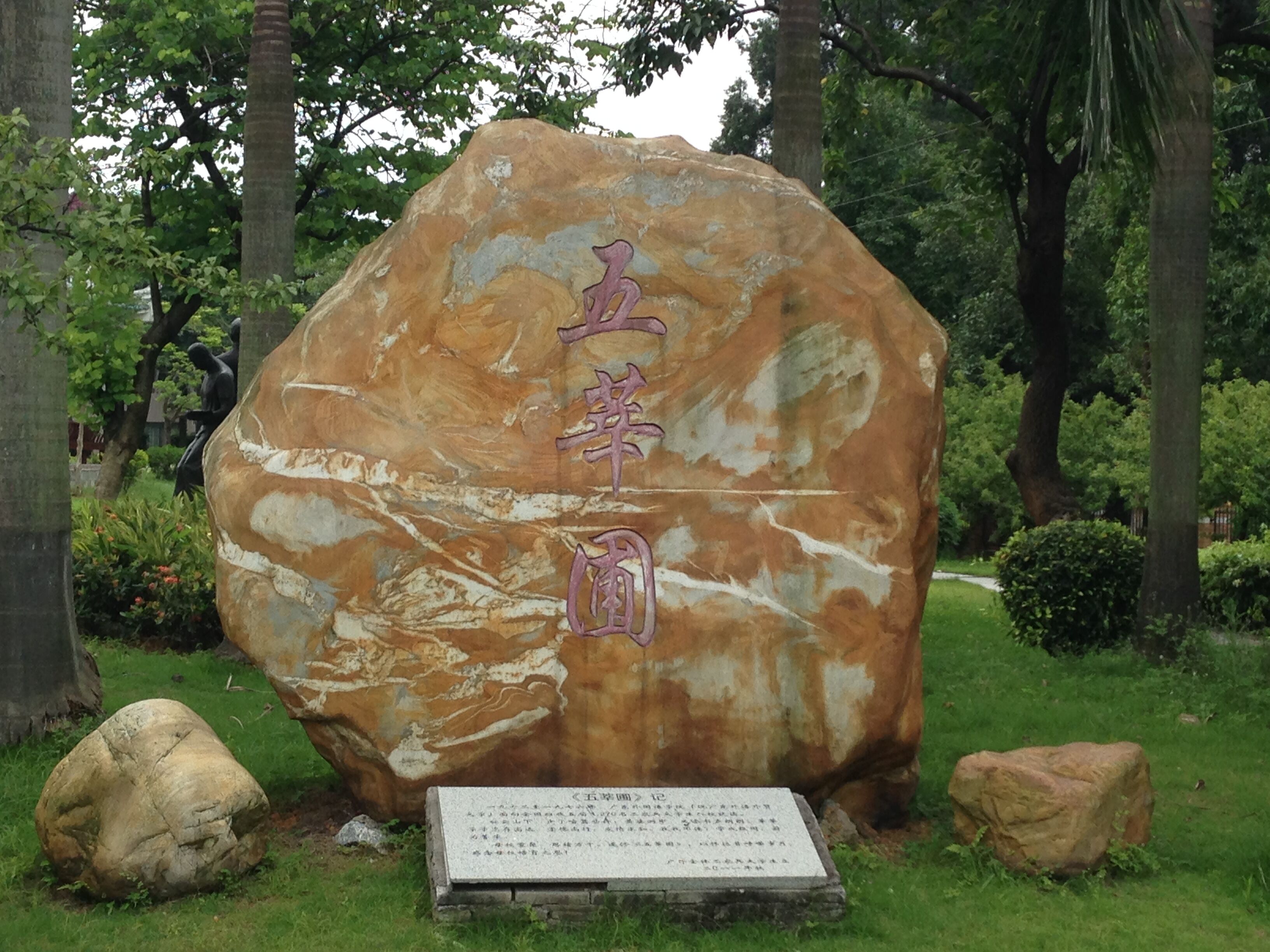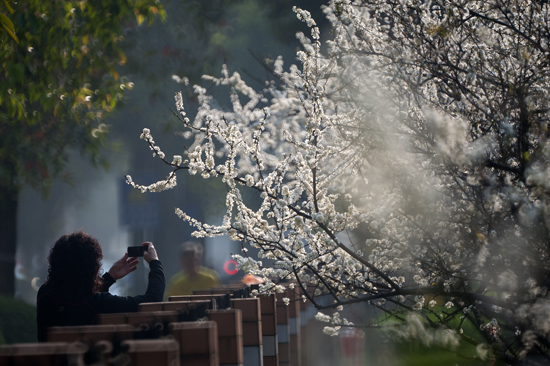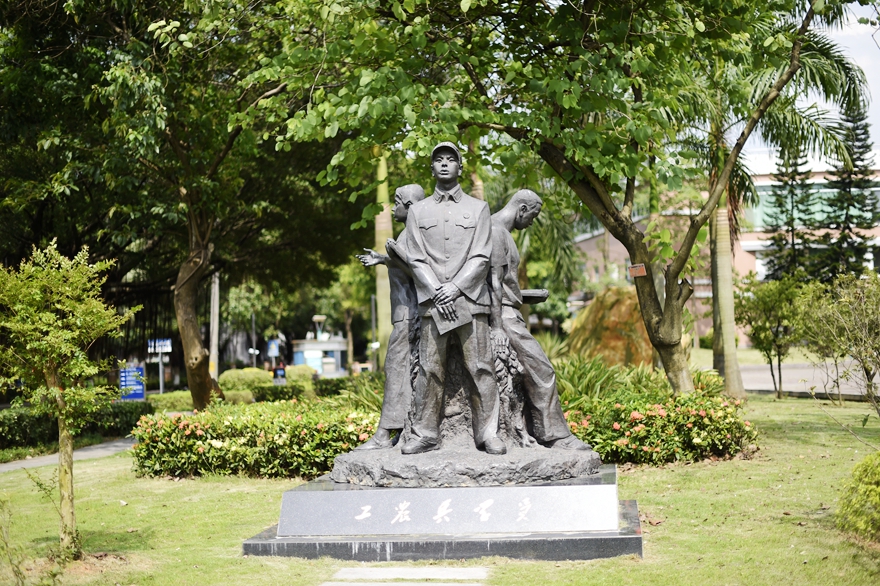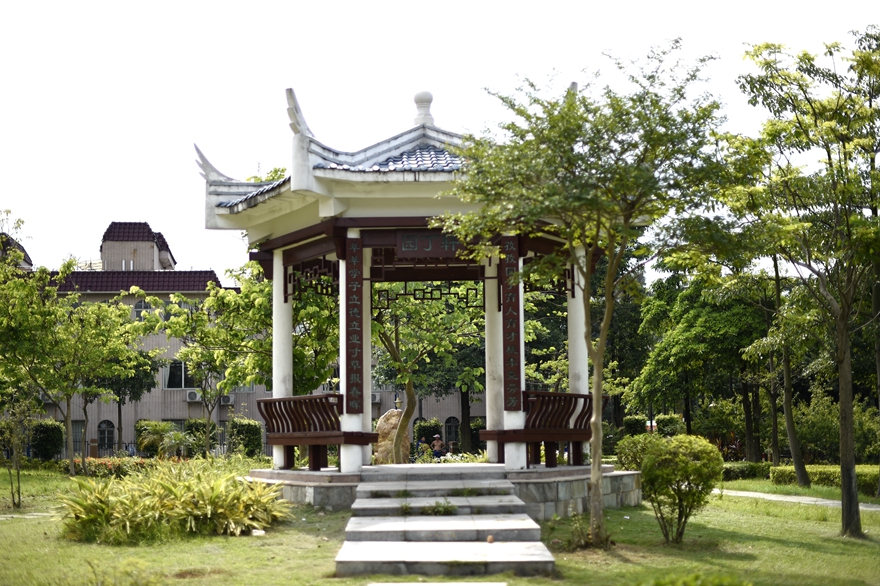The memorial garden of worker-peasant-soldier students of GDUFS is also called Wu Shen Pu. In Chinese, “Wu” means five and “Shen” means numerous students, so “Wu Shen Pu” stands for “the garden in memory of five generations of worker-peasant-soldier students who studied here”. It marks the history of that generation’s students who studied at GDUFS from 1972 to 1976. Funded by the class of 1972, 1973 and other worker-peasant-soldier alumni, the garden was inaugurated in 2001. It sits side by side with Yunshan Hall at the North Campus, with the university library on its opposite. Its existence means far more than a garden, because it marks the memory of an age, and acts as a symbol of the precious teacher-student relationships.

The verdant Wu Shen Pu
Decorating the Days
When spring comes, thin mist flows in the air and gently falls on the skin of plants and flowers. Crisp sunlight is reflected on the verdant woods in this elegant garden, shedding slowly through finger-wide gaps between petals. No snow falls during winter here, but the flowers of plum trees——what we call “icicles”——are always hanging from the branches of the plum trees planted around the garden. The crowd of plum flowers dances with the wind, capriciously scattering petals on the ground, and it looks like the ground is covered with snowflakes. Those fresh white petals, which are covered with dewdrops in the morning, shake their bodies tenderly as the wind blows.
Plum flowers are elegant. Whiteness and beauty are their fortune, but they are neither secular nor tawdry. They are as sedate as girls that have just passed their teenage years, collecting precious memories and storing them with carefulness. In early spring, plum flowers bloom for the first time, decorating the serpentine garden lane with their elegance. Every glimpse of its sparkling whiteness is fabulous enough to be framed into a picture. It seems that the blooming plum flowers on the trees represent the success of those worker-peasant-soldier students graduated from here.

in early spring, blooming plum flowers in Wu Shen Pu attract numerous visitors
Only in southern China can such gentle elves be raised. Every plum flower can be seen as a beautiful girl——there is always a deep lake in her eyes, as though they are telling stories of the old times. Mountains and rivers are reflected under her eyebrows, looking sunny and bright, as if they are meticulously painted by fine brush. Every step of her brings with it a delicate fragrance, descending from her sleeves, falling on her long skirt, as if scenes of the past can be recollected simply by following her.
Led by students from the class of 1972 and 1973, five generations of worker-peasant-soldier students showed their love for their Alma Mater in this very garden. Walking into Wu Shen Pu, the first thing that comes in sight is a big unadorned rock with the three Chinese words “Wu Shen Pu” on it. Lying on its foot is a monument. On November 12th, 2011, after an emotional introduction speech given by an alumnus from the class of 1972, Party Secretary SUI Guangjun, together with other leaders and alumni, officially unveiled Wu Shen Pu to the public. That day also marked the 35th graduation anniversary for the class of 1972 and 1973. Former Party Secretary and President XU Zhenhua, former President HUANG Jianhua, former Vice-Dean of the School LI Dao, teacher representatives and other alumni gathered around the garden, walked side by side, and talked about the old days.
For those five generations of worker-peasant-soldier students, the environment they lived, the people met and the goals they fought for were so different from those of today. The foundation of Wu Shen Pu records the unforgettable memories of these special students, and the journey they completed, which was an indispensable part of the revolution of education in China.
1972-1976: Time Is Your Witness
Walking past the rock with the garden’s name, there is the Memorial Statue of Worker-peasant-soldier Alumni. The three of them, who are marked with distinct characters of their time, are holding books in their hands and reading them carefully. To lots of university students, going to a university is just a “beginning”, meaning the pursuit of further education after finishing basic education. However, for worker-peasant-soldier students at that time, going to a university was a “returning”, symbolizing an escape from the crowded society to a clean land, where they could dive wholeheartedly into study again.

The memorial statue of worker-peasant-soldier alumni
In the 1960’s and 1970’s, because of the “Down to the Countryside” appeal, lots of “educated teenagers” in cities had to leave their homes and went to live and work in the countryside. Many high school students were distributed to different areas before their graduation. Those special working and living experiences enabled these students to have a clearer understanding of their educational ideal and how they could improve themselves. From that time on, they began to cherish every learning opportunity they were given. After returning to campus, they had become “sponges dying for water”, sucking essence of knowledge while swimming in a sea full of books.
“They had participated in work and training, some lasted for eight or even ten years. Because of this working experience, the gap between students’ age and education level is wide. The best time to learn a new language is before reaching 23, so some of the students found it difficult to absorb new knowledge. But they cherished the opportunity and worked really hard.” said WANG Guizhen, a professor from the former English Faculty, who is also a student from the class of 1970. She witnessed with her own eyes how hard-working her fellow students were during that period.
When the alumni were visiting the university’s audio lab during the 35th anniversary ceremony, some of them from the former English Faculty emotionally recalled the cassette recorders they used in the classrooms, which were already the best learning equipment they had at that time. Being able to put on a headphone and receive listening training on their own was, at that time, a luxury.
Students during that period worked really hard, and their teachers also devoted wholeheartedly to their teaching. “Devote selflessly” was a mainstream at that era. On the opposite of the statue is the Yuan Ding Xuan, which was built in honor of the teachers. It is a hexagonal pavilion with white paint, red wood and black roof.

Yuan Ding Xuan with white paint and red wood
According to an alumnus from the class of 1972 from the former English Faculty, XU Zemin, his teacher, WANG Duoen, was already a senior when he taught them. After finishing teaching in the daytime, he would always go back to the school at night to answer his students’ questions. They interacted a lot, and were very close to each other. At the ceremony, alumnus CHEN Shangzhi dedicated a poem to his teacher and was visibly shedding tears when reading out to some emotional parts.
Your Alma Mater Will Always Remember You
Wu Shen Pu commemorates not only a special generation of students, but a precious period of our country’s education revolution.
Students graduated from that period have gained proud achievements: LIN Difu, from the class of 1973, was once the ambassador plenipotentiary to The Republic of Botswana; WANG Yannan, from the class of 1973, is the co-founder of Jiade International Auction Company; HUANG Guowen, from the class of 1974, is the Dean of the School of International Studies in Sun Yat-sen University. HE Tongxin, from the class of 1974, was the Vice-Governor of Hunan Province, and now the Chairman of China General Technology.
Wu Shen Pu not only marks the footsteps of a past generation, it also encourages the new generation to move further forward. A student told our reporters that they have never really known this period of history before, but was deeply inspired by how hard-working those former students could be, even under such harsh environmental circumstances. Feeling proud of how much the older generation contributed to society, as current students, they also felt the need to work harder and achieve more.
This is in accord with the original goal of setting up Wu Shen Pu. The alumni said they set it up for three reasons: First, to thank GDUFS and their teachers for cultivating them, giving them a platform to make their day. Second, to mark a special period of history of our country’s education revolution. Third, to inspire the young generation of students to cherish what they have and spare no effort in their study.
This little garden is like a miniature of the worker-peasant-soldier students’ life. Though they are now living and working in different parts of the world, the memory they shared here, will still be as fresh and new as if it happened yesterday.
These old students will remember themselves as being a part of GDUFS’s history. To them, the experience of studying here lays a solid foundation for their future life. They will always spare a special place in their hearts for this irreplaceable memory.

